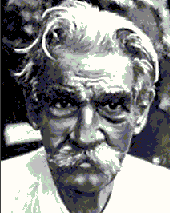By Albert Schweitzer
A Critical Study of its Progress from Reimarus to Wrede
Translated by W. Montgomery, from the First German Edition "Von Reimarus zu Wrede," 1906.
First English Edition, A. & C. Black, Ltd. 1910.

Albert Schweitzer
German theologian from Alsace, also famed as an organist, and a mission doctor who received the Nobel Peace Prize (1952) for his humanitarian work in the leper colony of Lambarene (central Africa)
The son of a Lutheran pastor, Schweitzer gained a doctorate in philosophy at the University of Strasbourg (1899) and the following year received his doctorate in theology. He combined the duties of lecturer in philosophy and preacher at St. Nicholas' Church. His book Von Reimarus zu Wrede (1906; The Quest of the Historical Jesus) established his name in theological studies. In this he stressed the eschatological beliefs of Jesus and St. Paul as the most radically historical fact to be faced in all of exegesis and theology based on the New Testament.
According to Schweitzer, the attitudes of Jesus and of his first followers were radically shaped by expectation of the imminent end of the world; historically, their world-views in no way resembled those that were foisted on them by popularisers like Renan, or polemicists like David Friedrich Strauss; the Jesus of Christian orthodoxy was also an imaginative construct; apologists of various tendency all shaped the elusive Jesus of the Gospels into moulds of their own devising.
After his exhaustive research, Schweitzer glumly concluded that the (mainly German) quest for the historical Jesus was leading nowhere. "There is nothing more negative than the result of the critical study of the Life of Jesus" he wrote. This conviction led him to a major crisis of confidence in the validity of current Biblical scholarship, as a result of which Schweitzer devoted the remainder of his life to humanitarian work in medicine, rather than to further study of Christian theology. Still, the magnificent final paragraph in his Quest shows him tenaciously drawn to Jesus as the mysterious, superhuman, ever-present Other, whose reality is better perceived in faith and religious following, than by scholarship:
"He comes to us as One unknown, without a name, as of old, by the lake-side, He came to those men who knew Him not. He speaks to us the same word: "Follow me!" and sets us to the tasks which He has to fulfil for our time. He commands. And to those who obey Him, whether they be wise or simple, He will reveal Himself in the toils, the conflicts, the sufferings which they will pass through in His fellowship, and, as an ineffable mystery, they will learn in their own experience Who He is."
In this e-text, I have omitted the Bibliographies at the beginning of each chapter, but have retained the notes (including those of the learned translator, F.C. Burkitt). What were footnotes in the printed text are here rendered as end-notes, to avoid the splitting of paragraphs in the e-text. Some of the verbal forms have also been modernised. P.R.
